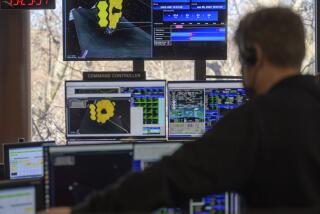Report of Rockwell Unit Sale Spreads Unease
- Share via
CANOGA PARK — From Anaheim to Simi Valley, Rockwell International Corp. employees, union representatives and civic leaders scrambled Wednesday for information on reports that the company’s defense and aerospace unit is for sale, but top executives tersely declined to comment.
“We haven’t heard a thing” about a possible sale, said Al Bernal Jr., an employee at Rockwell’s Rocketdyne plant in Canoga Park.
“There is tremendous uneasiness in aerospace,” said a woman who asked not to be identified. “We’ve been downsizing a long time.”
She thought she was getting a lifetime job when she was hired at Rocketdyne eight years ago, she said, but “nobody can feel good about their jobs anywhere in this day and age. We’re watching the aerospace business base shrink and the labor pool with it. We’re wondering how much lower can it go.”
Civic and business leaders in Southern California, aware of the economic pain created by years of aerospace industry restructuring, seemed resigned to the prospect of yet another billion-dollar consolidation.
“Rockwell is very, very important to our tax base,” said Marilyn Bruce Hastings, mayor of Seal Beach, the home of Rockwell headquarters. “But we also know that nothing can remain static in this world.”
Rocketdyne spokesman Paul Sewell declined to comment on the impact of a sale on legal problems facing the firm’s Santa Susana Field Laboratory in the hills between Chatsworth and Simi Valley.
The 2,700-acre outdoor test complex for rocket engines belongs mostly to Rockwell; NASA owns just under 400 acres. Rockwell has been scrapping many of the massive steel stands, where engines were developed for ICBMs and just about every manned U.S. space mission, but still tests engines there for use in satellite launches.
Rocketdyne is said to be close to paying millions of dollars to settle allegations of fraud and environmental and safety violations that sprang from an explosion on July 26, 1994, that killed two scientists.
While Rocketdyne maintains that the physicists died conducting a legitimate experiment, investigative sources have said they were illegally disposing of volatile rocket-fuel chemicals by blowing them up.
Rocketdyne also is fighting a suit filed by neighboring Brandeis-Bardin Institute in Simi Valley, which alleges that radioactive substances have leached into its ground water from the test site, where Rocketdyne tested nuclear reactors for the U.S. Department of Energy decades ago.
Times staff writer Greg Johnson contributed to this story.
More to Read
Inside the business of entertainment
The Wide Shot brings you news, analysis and insights on everything from streaming wars to production — and what it all means for the future.
You may occasionally receive promotional content from the Los Angeles Times.











